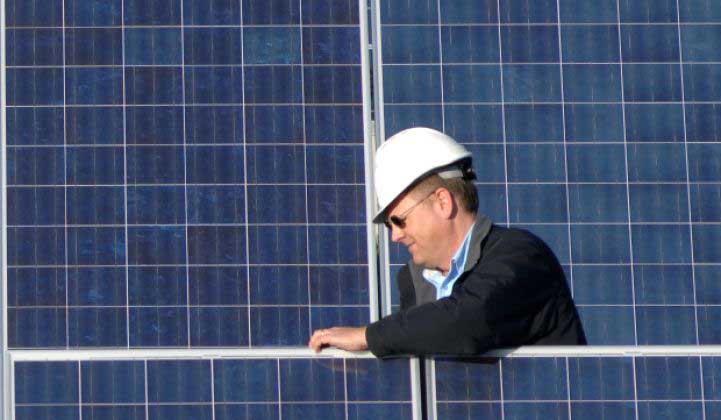Here Are the World’s Top Global Solar Developers

The global utility-scale solar PV project development landscape is rapidly evolving, with a number of large, globally diversified project developers asserting their dominance. Developers are increasingly looking to grow their portfolios outside of their home markets, and many now have projects in operation or under development in multiple regions around the world.
According to GTM's new report Top 15 Global Utility Solar PV Developers, GCL New Energy, China’s largest non-state owned IPP, is currently leading the way with over 5 gigawatts deployed and a further 7 gigawatts in the development pipeline. They’re followed by U.S. vertically-integrated First Solar with a total operational and development portfolio of almost 10 gigawatts and Canadian Solar, with 8 gigawatts.
Here are the top five global solar developers based on projects in operation or in development pipelines:
1,GCL New Energy
2,First Solar
3,Canadian Solar
4,Total (SunPower and Eren)
5,SunEdison
It should be noted that we define the term "global developer" as a developer that is active in one or more countries. There are a number of developers active in single markets (predominantly China, India and the U.S.) that have developed more capacity than some of the companies covered in our analysis.
The top 15 global solar PV developers account for 26.4 gigawatts of operational capacity globally and 20 percent of installed utility-scale PV worldwide as of the end of 2016. They have an additional 40-plus gigawatts of announced projects in the pipeline.
The project pipeline lends clues about the key areas of growth in utility-scale solar worldwide. According to GTM Research, 44 percent of pipeline projects are in the U.S., though some of these may be impacted by increased costs resulting from the recently announced tariffs.
Most of the largest developers are actively looking for projects outside of the well-established markets such as Europe and Japan that have provided much of the early growth in their portfolios. Very large-scale projects are now more achievable in emerging markets, and we're seeing that in the pipeline. Latin America, the Middle East and North Africa, and sub-Saharan Africa account for just 12 percent of operational projects, but 28 percent of the project pipeline.
In fact, 13 of the 15 top-ranked companies are active in developing projects in at least three regions around the world.
Several other key themes from our analysis include:
Project divestment: Several companies are moving toward a “build, sell and operate” model rather than keeping projects on their own books. This points toward an increasingly active secondary market for large-scale solar PV assets and an easy entry to the solar market for companies with money to spend.
The importance of tenders: All of the top 15 global developers are actively participating in tenders for large-scale capacity around the world.
Partnering on large-scale development: It is becoming increasingly common for global developers to enter into partnerships. They may look to partner with a developer with local market expertise – for example, EDF Energie Nouvelles’ partnership with Masdar in the Middle East – or simply to spread financial risk.







